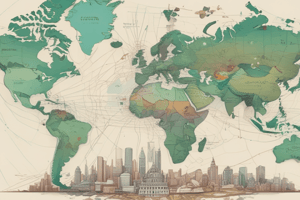Podcast
Questions and Answers
What is recorded in the Current Account?
What is recorded in the Current Account?
- Transactions related to goods, services, income, and transfers (correct)
- Transactions related to the purchase and sale of assets
- Changes in reserve assets
- Foreign direct investment
What is a trade surplus characterized by?
What is a trade surplus characterized by?
- Exports are equal to imports
- Imports are greater than exports
- Exports are greater than imports (correct)
- No trade occurs between countries
What type of exchange rate is adjusted for inflation?
What type of exchange rate is adjusted for inflation?
- Fixed exchange rate
- Real exchange rate (correct)
- Nominal exchange rate
- Floating exchange rate
What is included in a country's Foreign Exchange Reserves?
What is included in a country's Foreign Exchange Reserves?
What occurs when a country has a capital account surplus?
What occurs when a country has a capital account surplus?
What type of exchange rate system is determined by market forces?
What type of exchange rate system is determined by market forces?
What is a part of the Current Account that records the difference between a country's exports and imports of goods?
What is a part of the Current Account that records the difference between a country's exports and imports of goods?
What is an example of a transaction that would be recorded in the Capital Account?
What is an example of a transaction that would be recorded in the Capital Account?
Flashcards are hidden until you start studying
Study Notes
Balance of Payments
Current Account
- Records transactions related to goods, services, income, and transfers between a country and the rest of the world
- Includes:
- Trade in goods and services (exports and imports)
- Income from abroad (e.g., dividends, interest)
- Transfers (e.g., foreign aid, remittances)
- Current account balance:
- Surplus: exports > imports
- Deficit: imports > exports
Capital Account
- Records transactions related to the purchase and sale of assets between a country and the rest of the world
- Includes:
- Foreign direct investment (FDI)
- Portfolio investment (e.g., stocks, bonds)
- Changes in reserve assets
- Capital account balance:
- Surplus: net inflow of capital
- Deficit: net outflow of capital
Trade Balance
- Part of the current account, records the difference between a country's exports and imports of goods
- Trade balance:
- Surplus: exports > imports
- Deficit: imports > exports
Foreign Exchange Reserves
- Holdings of foreign currencies and other foreign assets by a country's central bank
- Used to settle international transactions and maintain exchange rate stability
- Includes:
- Foreign currencies
- Gold
- Special Drawing Rights (SDRs)
Exchange Rates
- The price of one currency in terms of another
- Types of exchange rates:
- Nominal exchange rate: the current market rate
- Real exchange rate: the rate adjusted for inflation
- Exchange rate systems:
- Fixed exchange rate: government sets the rate
- Floating exchange rate: market forces determine the rate
- Managed float: a combination of fixed and floating rates
Balance of Payments
Current Account
- Records international transactions related to goods, services, income, and transfers
- Includes trade in goods and services, income from abroad, and transfers between a country and the rest of the world
- Current account balance is calculated by subtracting imports from exports
- Surplus occurs when exports exceed imports, while a deficit occurs when imports exceed exports
Capital Account
- Records international transactions related to the purchase and sale of assets
- Includes foreign direct investment, portfolio investment, and changes in reserve assets
- Capital account balance is calculated by subtracting outflows from inflows
- Surplus occurs when there is a net inflow of capital, while a deficit occurs when there is a net outflow of capital
Trade Balance
- Records the difference between a country's exports and imports of goods
- Part of the current account
- Trade balance surplus occurs when exports exceed imports, while a deficit occurs when imports exceed exports
Foreign Exchange Reserves
- Holdings of foreign currencies and other foreign assets by a country's central bank
- Used to settle international transactions, maintain exchange rate stability, and intervene in the foreign exchange market
- Includes foreign currencies, gold, and Special Drawing Rights (SDRs)
Exchange Rates
- The price of one currency in terms of another
- Nominal exchange rate is the current market rate, while the real exchange rate is the rate adjusted for inflation
- Exchange rate systems include fixed, floating, and managed float systems
- Fixed exchange rate is set by the government, while a floating exchange rate is determined by market forces
- Managed float is a combination of fixed and floating rates
Studying That Suits You
Use AI to generate personalized quizzes and flashcards to suit your learning preferences.




